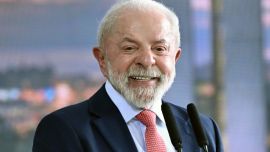In two years, Argentina's Javier Milei, 53, went from eccentric television panelist to president-elect of Latin America's third largest economy.
This is how he pulled off a massive election upset:
- Voters at boiling point -
Argentina went into the election with annual inflation at 140 percent and poverty over 40 percent, the latest in a long line of recurrent crises in one of the world's most unstable economies.
"Everything is already broken. Milei isn't going to break anything," said student Agustin Baletti, 22, before the election, adding past governments "left young people without hope."
Analysts say the main driver of Milei's victory was voter anger at the status quo, rather than his personality or views against abortion, the Pope, or denying humans were behind climate change.
Argentines were "gambling for resurrection," said Buenos Aires-based economist Andres Borenstein, with the Econviews thinktank.
Mariana Peinado, senior analyst with the Atlas Intel pollster, said surveys that predicted a Milei victory showed most people were actually against his policies of making it easier to carry guns or even ditching the peso for the US dollar.
Milei had suggested a referendum on abortion, but most of those surveyed were in favor of it being legal.
While many voters didn't seem to feel passionately about his more controversial comments, they did back curbing spending "even if that means less social expenditure."
Ana Iparraguirre of the GBAO Strategies thinktank said their data showed "half of Argentines feel the next generation is going to do worse economically than they did. There's no social mobility."
While healthcare and education were free under the Peronist government, these had been getting "worse and worse".
- 'The lesser evil' -
Going into the vote, up to 10 percent of voters were undecided, polls showed, and many told AFP they had just picked "the lesser evil."
Architect Sofia Speroni, 33 said she voted "to say no to corruption, our current situation."
"Many of Milei's voters were less attracted to Milei than repelled by (his rival Sergio) Massa," said Benjamin Gedan, director of the Argentina Project at the Washington-based Wilson Center.
Massa's "dismal performance" as economy minister "led many Argentines to doubt he would do any better as president."
- TikTok and the youth vote-
The wild-haired Milei, who often refers to himself as "the lion," courted a rock-star persona, dressing up as his superhero alter-ego Captain Ancap -- short for anarcho-capitalist -- and waving around a live chainsaw to indicate cuts he wants to make to state spending.
Gedan said this "iconoclastic style" explained his appeal, as it "signaled a radically new approach to leadership."
With a youthful social media team, he also carried out his campaign partially on TikTok and YouTube.
The AtlasIntel poll showed 68 percent of Argentines between the ages of 16 and 24 backed Milei before the vote.
"Milei became very popular because he appeals to the emotion. He's a TikTok guy," said Borenstein.
Milei points out "politicians are corrupt... and people know that because we see the politicians and they are very, very rich."
Iparraguirre said it had been a fight between "the old way of communication in traditional media and billboards and using state funds" and "a more organic way of communicating through new media and followers connecting with young voters."
In one video of celebrations on Twitter a young man interrupts a television broadcast to shout: "Massa, you moron, you were beaten by five fat guys on Twitter."
- Opposition backing -
After the first-round election, Milei was seven points behind Massa.
Then he won the backing of the third-placed center-right opposition, including former president Mauricio Macri, and toned down his rhetoric.
"In the end, he consolidated most of the opposition votes," said Iparraguirre.
"He managed to reassure voters that he would not move forward with some of his most radical proposals like privatization of public health and education."
__ TIMES/AFP

















Comments